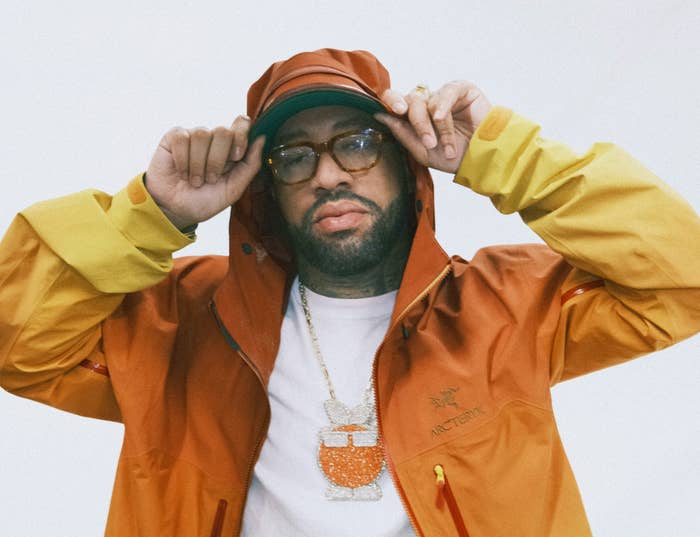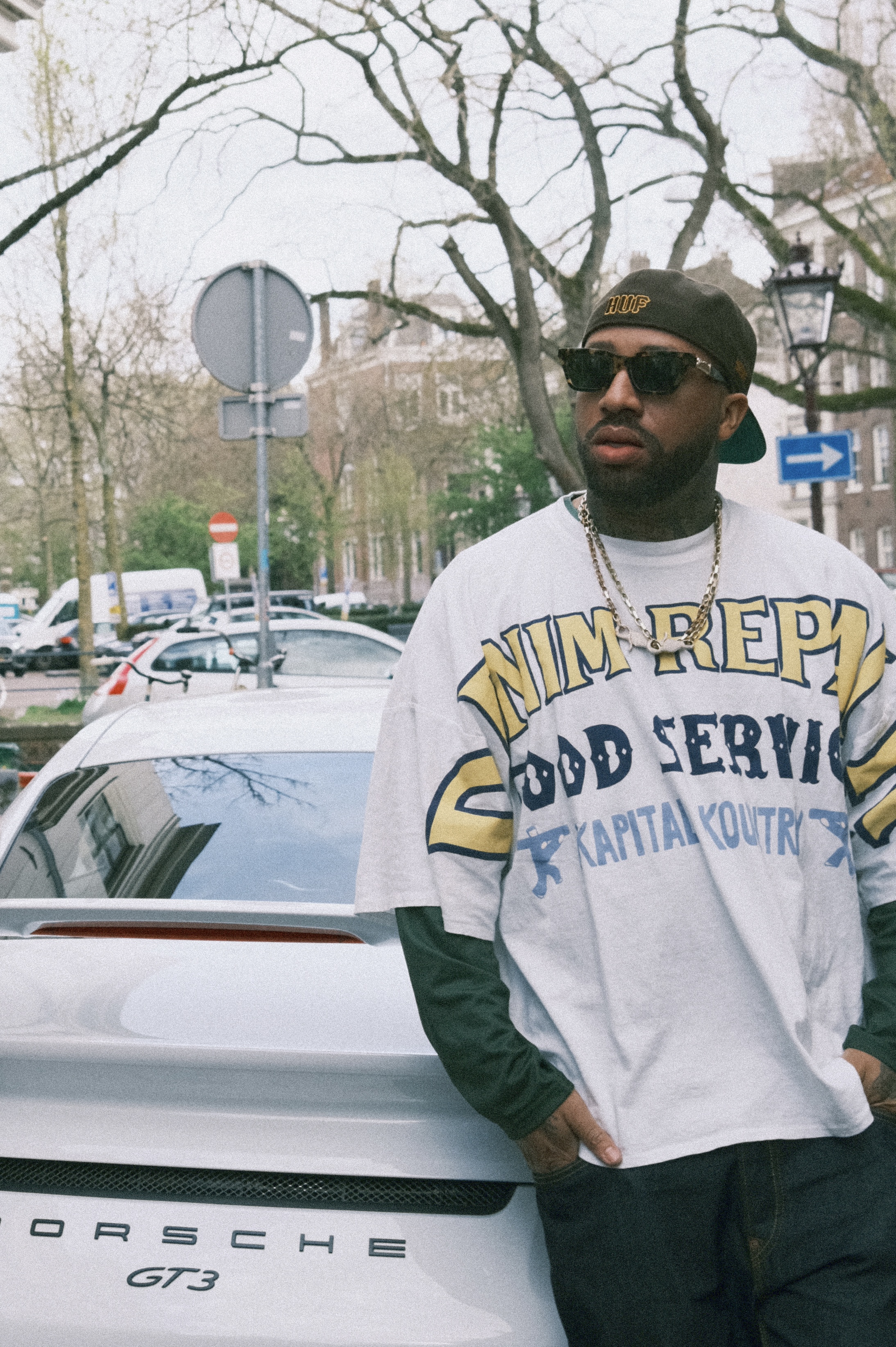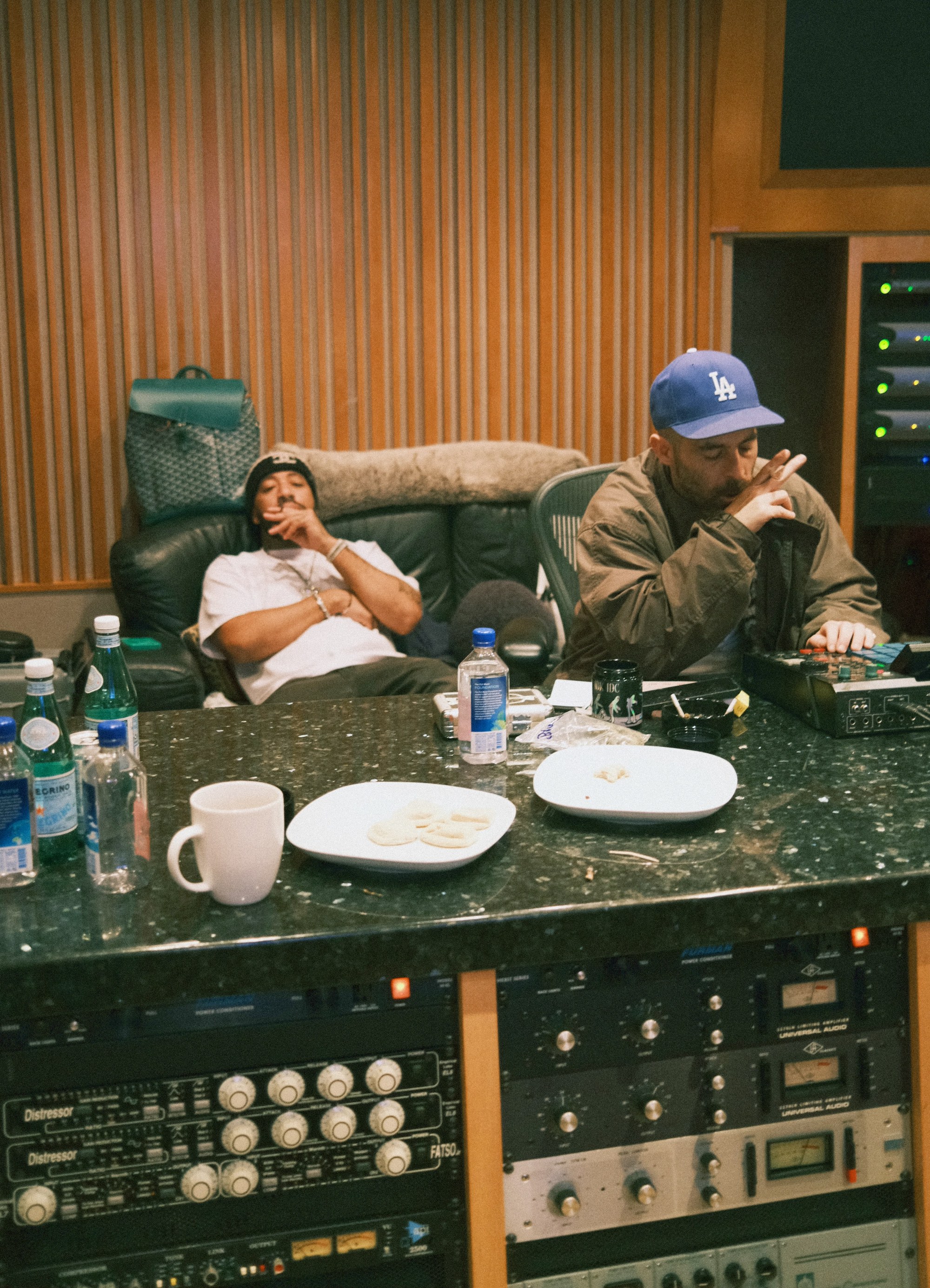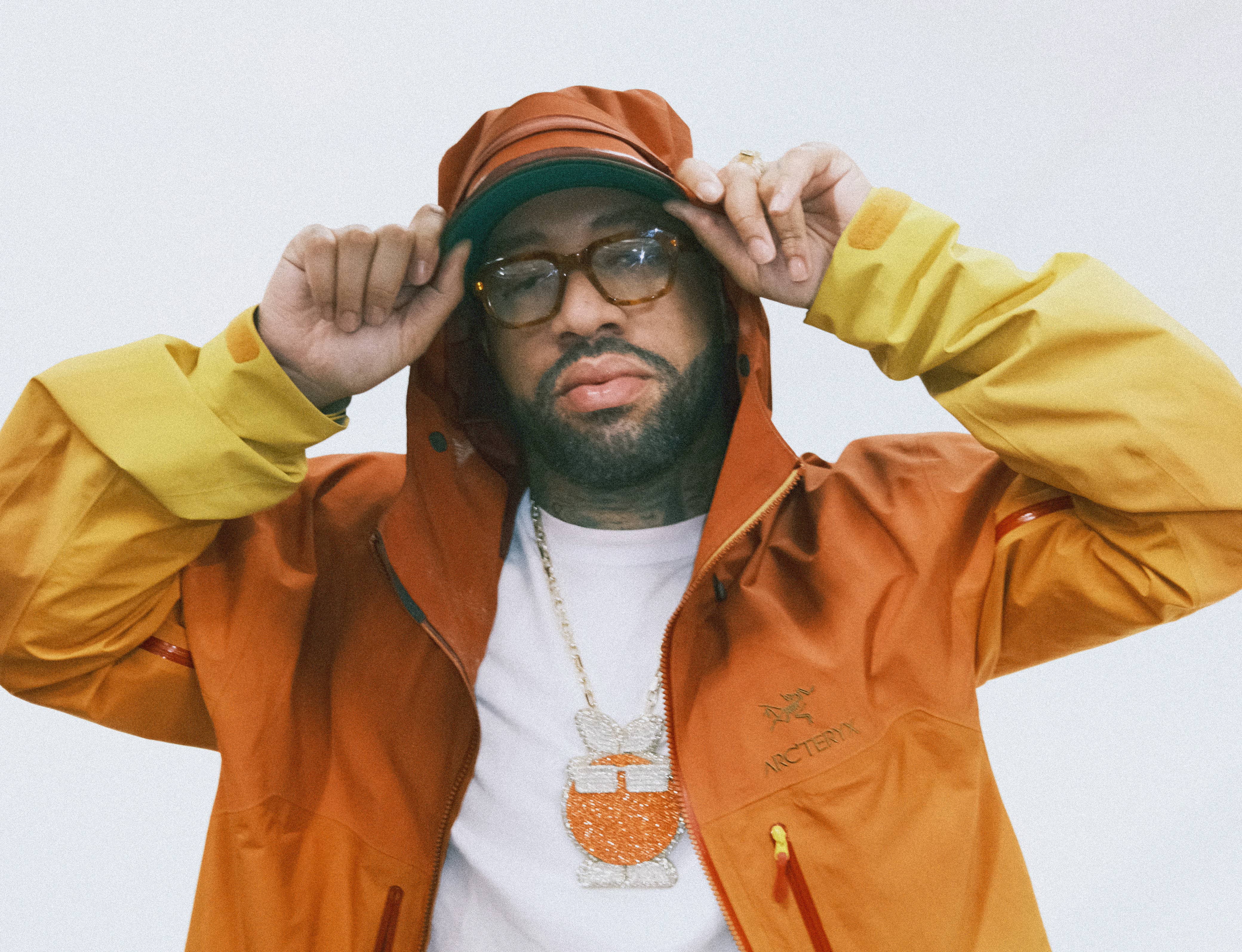
The Bay Area has always danced to a different tune. From idiosyncratic subgenres like hyphy, to the ocean of pioneers the area’s produced in E-40, Keak Da Sneak, Mac Dre, Too $hort and Messy Marv, the San Francisco hotspot has always been way, way ahead of the curve. It’s not just music that they do differently over there either—they have an entirely different way of doing business, too. The “hustler mentality” defines the vibrant town’s perspective on commerce, and it rests on two tenets: a tireless approach to money-making and, perhaps most importantly of all, building personal relationships with your consumers.
For Larry June—who just released The Great Escape, his new collaborative album with super-producer The Alchemist—that last point is everything. Even before he was making music, the beloved underground rapper was selling t-shirts and homemade juices from the trunk of his car. Making money was the point, of course, but the real goal was always to meet your customer face-to-face, shake their hand, and make sure they kept coming back. Even now, as most commerce has moved to solely online, the value of face-to-face sales is paramount.
Larry and Al flew over to Europe (first to Amsterdam, then London, and then Paris) for a quick run of small, intimate free shows recently. The very popular merch table at each show was the only source of income for these dates, which ran at a loss, but that didn’t matter because, at every turn, Larry June was figuratively popping the trunk, shaking hands, taking selfies and making memories with a fanbase who would value that forever.
We managed to catch up with Larry June just before he went on stage at London’s Omeara. The show was free to enter; all fans had to do was register and get their name on the list before they hit capacity—which ended up being approximately a 30-second window. The line was round the block and, inside, it was a packed sweatbox. Even Larry, ever a paragon of self-belief (“Good job, Larry”), seemed a little surprised by how rapturous the support was—even if he did his best to hide it behind sunglasses.
“You can’t just say you’re a rapper and expect people to care—you have to put that time in. You shouldn’t expect nobody to believe in you when it’s not happening.”
COMPLEX: How would you say the Bay Area has influenced you as an artist?
Larry June: Oh, man! The Bay Area’s influenced me a lot, from Mac Dre to The Jacka, Messy Marv, E40, Too $hort... It’s that I don’t give a fuck kinda energy, that I’m gonna talk my shit on these groovy beats kinda energy. I got a lot of influence from the Bay Area. Everything I do, musically, the Bay Area’s influence is heavy.
One thing that typifies the Bay Area mindset is the hustler mentality, but also the meeting your consumers and your fans face to face—“pop the trunk”, as it were. Is that still the case with the internet and stuff?
That’s a great question. It used to be a huge thing but not so much now. Everybody would be coming through, selling CDs out of the trunk. Everybody was doing that—every rapper that I knew, from big to small. I think, with the internet, a lot of things have slowed down. The internet kinda took over a lot of things, but I still use that model where it’s hand-to-hand. Even now, travelling around different countries, you’re not making no money, you’re just pushing the word hand-to-hand, interacting with the people and giving them something they can keep forever. So I think it’s still important. You don’t want everything to be digital. The fans still wanna be able to feel you in the flesh and see you in the flesh, so that’s what we’re doing. I appreciate the hustle. I love the challenge, man.
You’ve released a lot of projects, sometimes two or three a year, but they all have their own identity. They’re all recognisable as being West Coast, though, whether it’s the G-funk element or the soul influence. How would you describe the West Coast sound?
I guess it’s a feeling. That feeling that makes you wanna get up and hustle and make some moves, and when you feel like you’re stagnating a bit or overthinking things. It makes you feel like you’ve gotta make it happen! And it comes from a real place in my heart. From the samples I use to my tone of voice and things I’m saying, you feel it. And that’s my goal. When I’m making music, I’ve got to feel it first. I’m my own biggest critic—I think everything I do is kinda trash. That’s just what it is.

Are you able to go back and listen to your stuff afterward or do you just never want to hear it again?
I actually only listen to my music, for the most part. I don’t listen to nothing else, because I realised that I’ve built a fanbase that loves things I did in the past and I don’t want to ever lose that. So what I do is I go to my previous tapes and I listen to certain things and I critique it. I’m always trying to do better because this is a once in a lifetime opportunity for me. You never know if you’re gonna get an opportunity like this again, so I wanna make sure I’m critiquing the sound.
I was really happy to see you were working with The Alchemist on The Great Escape. When you’re working with a producer who has such a big presence on everything he does, how does it compare working with him to other producers you’ve worked with in the past?
I’ve worked with a lot of producers that have big presences like that, too, like Cardo and Harry Fraud. Al was different, though, because he had a very particular sound and I did, too. So, at first, I came in there kind of like, “Shit! How we gonna do this? Should I rap, like, super hip-hop? Because, you know, he’s a legend.” But I said, “Fuck it! I’m gonna do me.” So I brought my world into his world and we created a sound that we can do over and over again. When I do music with one producer, I like to create a sound that I can always come back to. If you listen to my catalogue, you will hear different pockets on different tapes because I’m bringing my world into their world because it’s a collaborative project. It’s just one rapper, one producer, so it’s like we’re creating a pasta. It might not sound like my solo album. My solo project might sound completely different because I’m making a gumbo at that point, putting all kinds of things in there. It was cool working with Al, though, man. He’s super down to earth, and he’s just like us: a young soul. He’s probably more active than us! [Laughs] It’s fun.
Are there any plans to do more together? I know you’ve worked on stuff before this.
We’ve got more songs with me and him rapping on. We’ve got bonus material. One thing I can say about working with Alchemist is I have a huge hand-to-hand, word-of-mouth fanbase that wasn’t off the hip-hop scene or whatever. It was more just like, “Oh, we fuck with Larry. He’s a hustler. He just did this, this is crazy, he rapped on this.” He brought a different audience to me. People critique lyrics a lot, which I don’t give a fuck about. It was still dope to get into that lane with him. It’s a dope world, buying crazy vinyls. Me, I come from the streets—busting moves, pulling them whips out. I don’t know shit about vinyl! It was dope being able to collide because he taught me so much. I learned so much working with Al, and vice versa. This has been the most educational experience I’ve had doing a project with somebody.
“I didn’t really wanna rap. I wanted to make beats, so I made beats first... I started out by making songs on the karaoke machine.”

What do you look for when you’re working with a producer?
I’ve gotta be a real fan and I have to see myself actually working with you. So I dig into you as a producer, as an artist or whatever, and I ask myself: “Will this sound good? What I’m trying to do?” I turn down a lot of stuff. Not that I’m not a fan of certain people, but I know that I might not sound the best on their stuff. You want it to sound good—you want it to sound natural. Kicking it with Al, we kicked it every day in the studio, hanging out, watching high-speed chases and smoking weed. He showed me records and played samples and shit, until it became a friendship—organically. That’s what I look for, like a friendship, good music, chemistry, good people. He’s a good person; he’s very passionate. We have a lot in common and the music speaks for itself so it was an honour for me, as an up-and-coming artist, and him doing so many legendary things in his career.
It’s funny that you call yourself an up-and-coming artist because, obviously, you’ve been making music for a long time.
I say up-and-coming because I didn’t take it serious until 2018. The grind is the grind. Imagine if you’re doing what you’re doing for years and years, but you never told nobody, you just kind of made a YouTube channel and did it, but nobody ever saw it. That’s kinda how I feel about my old shit: I was practising and learning about it and trying to figure out my shit. So I’m not gonna come to the game with an ego. I’m just me and I know the ways to go and I’m ready to take those necessary steps.
I watched the interview you and Al did on Sway, where you talked about that period and how you changed your attitude and became a bit more positive. What caused that change in mindset?
I think, once you learn that there’s only one you and you are special because of what makes you unique… I start rapping about things that I actually like to do. Even if it sounds corny, I just started talking about it over cool-ass beats that I liked and telling personal stories that people can relate to and understand and give people hope. That’s what changed it. I feel like it was more from the heart. It wasn’t just me making a song—it was more, like, me explaining everything.
I know you’ve spoken a bit about how your dad dabbled in music back in the day. Did you start making music because of your dad’s experiences in music, or in spite of them?
My dad never influenced me musically. He influenced my lifestyle. Pops was a super-fly! He was in the D-game, a real big dope boy in the hood. He had all the muscle cars: the Toyota Supras, the 442s—all the shit. He was the man! Image-wise—the white tee, the cars—that’s my dad’s influence. I have no problem saying that. Musically, I didn’t really wanna rap. I wanted to make beats, so I made beats first. My cousin, Baby DC, he was Too $hort’s first artist. Before Lil’ Bow Wow, before Lil Romeo, he was doing shit with, like, Aaron Carter on Nickelodeon. He was getting free clothes sent to his house and I’d be sitting there, like, “This is the shit!” But he thought it was corny as hell. He’d be in the basement making beats and he rapped, too, so he was a big influence on me, musically. He was my favourite rapper for a long time as a kid. Then I started making beats and it’s crazy, because I was making songs on the karaoke machine. What I would do is I’d make the beat on the keyboard, a six-track Yamaha Keyboard, and the karaoke machine that had two microphones. I’d put one mic on the speaker of the keyboard, play the beat, and rap on one on the tape.
Wow.
I did all kinds of shit. And it was just practice, man. When ProTools came out, it was crazy. I’d known Ghazi [Shami, founder of EMPIRE Distribution] since I was 12, and he came to my dad’s house because he was in the music industry on the street level. Ghazi came to my house and set up ProTools for an artist named Juice, but they didn’t want to use it. I was a little younger, a little more hip to technology, so I taught myself how to record. I was really making beats and I was teaching myself how to record and I fell in love with it. It actually sounded good! I was just practicing on that, but that’s how I became a rapper.
“Alchemist is super down to earth, and he’s just like us: a young soul. He’s probably more active than us! It’s fun.”

One word I always hear next to your name is ‘authentic’. With all this success that’s coming to you now, how do you keep your feet planted and not get too carried away?
I just never forget the end goal. I’ll be tired sometimes, but you’ve got to keep going. Not to be cliche, I just know that where I came from, it wasn’t the best situation so I’m always thankful. I’m always making sure I put the right time into it—no matter what. I’ll be tired as hell; sometimes I wake up in the morning like, “Fuck all this shit! I don’t wanna do 60 shows,” but I have to always remember the end goal. When you’re stressed out or you trying to figure it out, where do you want yourself to be? There’s a lot of things I still want to do. I can’t stop now.
Do you think part of that’s down to the fact that your success came when you were a little older and wiser rather than when you were 19, thinking you were immortal?
Yep, definitely. I’m thankful that it happened at this time because I understand that it’s precious and it’s an opportunity that you don’t always get. I don’t even hang with girls. I’m so focused on just getting it done right now, man. You just never know.
You said somewhere that you jump in the studio at, like, 5am—before you send your kid to school.
I used to when I was building my name; I’d get up five in the morning, record for a little bit, take him to school, come back, record more. I was building something then, but there’s levels, right? Now, I’m on a different level. If you do the same shit, you get the same results. I can make about six albums a year and get the same results, so I did that for a couple of years and then I stepped it up. Now it’s like, “Okay, what can I do to make it bigger? You’ve gotta come with a bigger bang every time and not stagnate.” So I started incorporating a team and formulas to make it work. I wouldn’t be able to do all this shit without a team, but you’ve got to make people believe first. You can’t just say you’re a rapper and expect people to care—you have to put that time in. You shouldn’t expect nobody to believe in you when it’s not happening.
You’ve got your merch line, a juice shop and a couple of other business too. For Larry June, what does the future outside of music hold?
What I want is more perpetual income. That’s why I’m big on owning my catalogue and my masters. Not to be crude, but when I’m older, I need to be making the revenue. Projects are like real estate because you’ve got them forever and they’re constantly making money. It can be bigger than real estate if you’ve got good product. So that, and maybe do more ventures, more juice shops, and building up my family members like my little brother—he’s a rapper. Maybe find another artist put money into the right things that makes sense. I’ve got four different businesses right now. I’ve got just enough where I can focus on music and continue to go up and then, eventually, I can sit back and I can rap when I feel like it.



